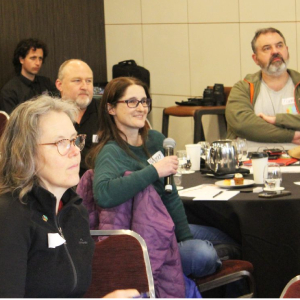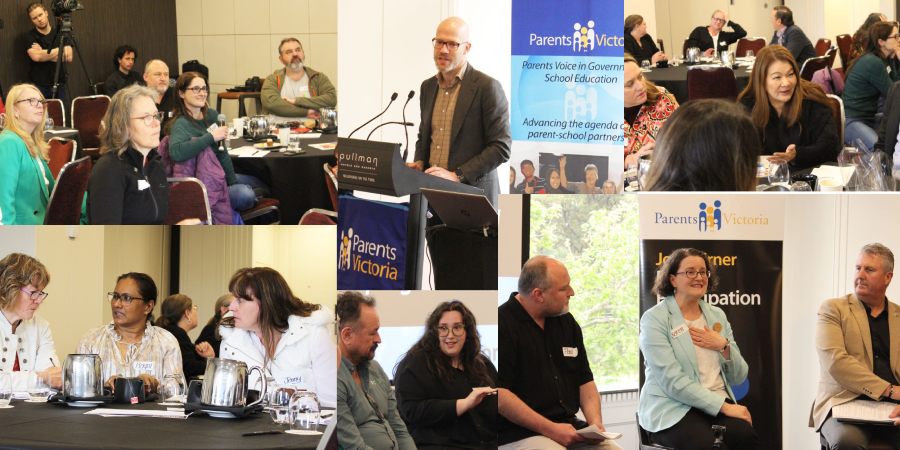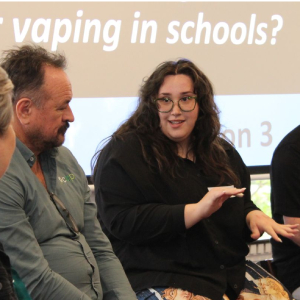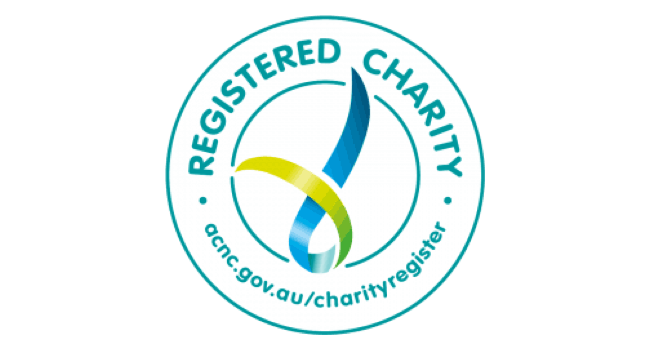Conference Opening
 Stephen Fraser, Deputy Secretary, School Education Programs and Support, Department of Education
Stephen Fraser, Deputy Secretary, School Education Programs and Support, Department of Education
Stephen informed conference delegates that with the very recent Victorian Cabinet changes, the new Deputy Premier and Minister for Education, Ben Carroll was unable to attend and provide the official opening to Parents Victoria’s conference. Stephen did acknowledge he has been a long and fierce friend of Parents Victoria (PV). PV is very appreciative of Stephen’s attendance and willingness to step in last minute to do the official conference opening, especially on a Saturday! Stephen shared the following messages:
- We (Victoria) are coming out of change and have just installed the second female Premier. Stephen recognised the work of the first female Premier, Joan Kirner and her link to PV (as a former President of the organisation).
- The new Deputy Premier and Minister for Education is keen to engage with PV and other stakeholders
- Minister Natalie Hutchins would have loved to attend – her commitment to parent engagement and the system doing its best for those vulnerable in the community, was her focus and dedication.
Stephen raised that in thinking about the nature of public education and the road ahead – why are we here and what do we value?
- It’s important to think about the social contract of public education. The contract of society/state – of which public education is one part.
Parents give over responsibility to the State – under conditions – saying you will educate my child. It’s a huge commitment. The best way to educate our children is to bring them together. - The relationships are the fundamentals of the social contract.
- Social contract is at risk of being eroded if there is a mindset of “what does it matter to miss a few days of school?” The value and importance of public education matters most, to the most vulnerable students.
- The changing nature of social contract and changing the system to match (pace and scale) is important. Victoria has seen much change from 10-20 years ago, e.g. GPs in schools; mental health practitioners; mental health funding menu – a massive investment. We are almost keeping pace!
A team based approach and a focus on the child is what’s needed. - Advocation for 100% SRS in Victorian government schools (sooner rather than later) is needed. (See Trevor Cobbold’s presentation below).
We should think about allocating funding to a wider range of services (not just teaching). Otherwise we load up the expectations on teaching staff. A wider health and wellbeing workforce to work alongside teachers. - PV asked Stephen regarding our objective to have a Family Engagement Officer in all schools. Stephen acknowledged that some schools are doing this in a variety of ways; and how this would be resourced, is a challenge yet to be worked out.
Joan Kirner Award
Stephen acknowledged Joan Kirner’s commitment to public education; that she was a staunch fighter for parent engagement and that it’s absolutely fitting that this Award is named in her honor.
Congratulations to Danielle Bell, President, Croydon Hills Association of Parents (CHAPS) nominated by the school principal, Christian Holdsworth.
Danielle was working the day of the conference so Christian, School Council President, Sian and CHAPS member Nikky assisted PV in presenting Danielle with her award on Friday afternoon, 6th October in order to have her photo to share at Conference when the winner was publicly announced.
Relationships: a Constructive Focus
 John Hendry OAM
John Hendry OAM
John shared how to have quality relationships; to have empathy and to embed a kind culture in all that we do.
- Culture in schools is important – and how we can develop good cultures, which are centred on kindness and forgiveness.
- Schools need to be safe; You can feel the culture in a school; Do parents trust the school – if not, why not? Do you give the school a break if something goes wrong or there is a mistake made? Forgiveness enables and this is very important.
- Bullying is an inappropriate use of power. We need to teach about relationships – currently it’s taught superficially.
- The five elements of a relationship are key:
- Trust is fundamental and initial. It’s giving.
- Forgiveness. Is giving someone a break – e.g. giving for the person, the team, the school.
- Integrity. Sometimes you stuff up. But the intention is important (the social contract). Do no harm (as you are not licensed to harm). Build a culture around this. It’s uplifting. There are obligations in a social contract. Treat others as you want to be treated.
- Hope is dynamic. Optimism is static. John suggested researching studies about Hope.
- Compassion is empathy and action through care. We want young people, parents and teachers to understand this.
- When students attend school, they are put into many relationships.
- If relationships are nurtured – our mental health is better.
- John encouraged delegates to look at the Grant Study (Youtube)
- It’s important that you and others are trusted to do your best.
- Introducing kindness and forgiveness into the school – parents, students and staff all play a part.
- On what basis do we form relationships? John referenced John Bowlby attachment theory.
- How do we create a system which deals with mistakes? Relationship Reparation goes to the social contract. We have obligations to others in our “group”. John referenced Zachary Shore (and his book Blunder).
- When delivering RbE in schools, John asks students – are you a good friend? Is your friendship formed on the basis of giving, not taking? John referenced Adam Grant: “Turning takers into givers.”
- Lift the discussion to focus on relationships. We want resilient relationships. How do you recalibrate relationships? John encouraged parents and teachers to think about that relationships matter.
Education Panel discussion with parents – The way forward
Panel:
- Andrew Dalgleish, President, Victorian Principals’ Association (VPA)
- Karen Dimmock, CEO, Association for Children with a Disability (ACD)
- Paul Fry, PV Board Member and School Wellbeing Teamleader
- Mark McLay, CEO, Country Education Partnership (CEP)
- Meredith Peace, President, Australian Education Union, Victorian Branch (AEU Vic)
- Keisha Healy, Youth advocate
Topics and Q&A
School Funding
Q1: Why the School Resource Standard (referred to as the SRS) should be at 100% for public schools now, not by 2029?
- Most of the students who require the assistance are in Government schools. Victoria is one of lowest funded jurisdictions.
- Parents need to advocate collectively on this. Voters and stakeholders need to speak up.
(Refer to ‘Government school funding in Victoria – the facts’ below)
Designated School Zones
Parents and Carers are advising it’s getting too hard to enrol into Victorian Government schools of choice. This also creates additional workload for schools.
Q2: Should the Victorian Government review the department designated school zone policy?
Comments included:
- The policy puts schools in a difficult situation
- Parents can appeal a decision but how does that impact on the relationship with the Principal if the decision is overturned by the Regional Director
- Policy states there is choice – not the reality for some
- Zones are shrinking
- Some things just make sense – taking siblings of students already enrolled.
- Funding is based on enrolment numbers, adding more complexity
- How can parents be expected to navigate a number of students at different schools? It’s problematic – attendance, isolation, mental health, relationships declining where students are split across schools.
- We are part of a system which is limited. Do we accept to move resources to a school which has great enrolments (a highly desired school and one which parents move house to go to the school)?
- We want strong public schools so kids can go to the local school
- Don’t want parents traversing across Melbourne to get to school
- We want students staying in their local community
- Students attending with confidence and connecting with local kids
Vaping
Vaping is a hot wellbeing and disciplinary topic for schools, parents and students. It is unlawful to smoke or use e-cigarettes (vapes) on school premises or within 4 metres of a school entrance.
Q3: Why doesn’t the Department of Education serve infringement notices for vaping in schools?
- It’s not about punishing. It’s about education and support
- Students who don’t feel supported, don’t want to engage (learn)
- Not knowing what attracts students to vape, some young people would say there are other issues
- Punishment is a band aid fix. It’s about education for students, parents, staff. When parents are vaping – what message does it send. Where do students get the vapes?
- Let’s educate around the harm. Use community and health organisations such as Quit Victoria/Cancer Council Victoria
- There are not enough police to manage infringement notices
- Need students to understand and acknowledge it’s harmful rather than – “it’s cool and everyone is doing it”
- To understand the care around this topic – the trust of students needs to be present
- Educate also from outside the school (for the families)
- Rules are in place – public schools are government owned and you can be fined for smoking. Communicate the legislation and rules
- An on-the-ground solution given was piping classical music into the toilets (get schools to share examples of what works best)
- We need education on human behaviour – the heart of the issue
Workforce Shortages
Noting the ongoing leader and teacher workforce retention challenges facing schools. PV is seeking the Victorian Government to fulfil our 2022 State Election Lunch Order for Family Engagement Officers (FEOs) for Victorian Government Schools.
Q4: Do panel members agree this additional human resource would assist to reduce workload?
- Yes – definitely supportive of FEO’s. It’s a connector – school staff/leaders with parents. It’s a valid solution.
- The role could assist with school staff workloads. And to nurture relationships. We need government to invest in different strategies.
- Other suggestions included paying student teachers when they do placements (most need to have a job to be able to study – but need to give up their part-time job to complete placements)
- Pre-service teachers who are being trained in the public school system are being snapped up by schools from other sectors (independent and catholic). Consider scholarship money and incentives to stay in the public system. Those trained in the public system should be bonded (e.g. for an agreed time).
Inclusion – students with disability
The education system is letting down too many students with disabilities. There are too many children who can’t go to school, they are excluded, don’t have a sense of belonging, don’t receive the learning adjustments they need (as recommended to schools from their medical and allied health practitioners) and experience bullying, restrictive practice; physical and emotional harm.
Q5: What changes are needed to transform the education system to support teachers, schools and families for better outcomes for all children with disability?
- The Disability Royal Commission Report gave strong recommendations and reinforced what families were saying
- School leadership need to embed a culture of inclusion (learn together).
- Education Support officers are terrific and not talked about. Invest in their skills and contribution. Making sure teachers have planning time and PD – more resourcing to do this effectively
- Consultation is talked about but what WE NEED is CO-DESIGN
- Talking to the relevant young people with the lived experience
- Students want school to feel safe – it’s not a huge ask
- Education for the whole-school
- Keep an open mindset about what needs to happen
- Students are being excluded from school as the supports are not always in place
- Make reasonable adjustments and check whether we need to change the actual education space? To enable students to fully participate.
- Teacher training doesn’t go far enough
- Tap into parent knowledge
- Good handover from kinder to school is needed
- Re NDIS – have a Digital Inclusion passport throughout education to streamline and reduce workloads to schools and parents.
Government school funding in Victoria – the facts
Trevor Cobbold, National Convenor, Save Our Schools (SOS)
SOS advocates for a high quality public education system and increased equity in education.
After lunch Trevor unpacked school funding in Australia in plain language and what needs to change. In Trevor’s presentation he emphasises:
“Unless the new bilateral agreement on school funding to be negotiated between the Commonwealth and Victorian governments next year to apply from 2025 is substantially revised, public schools will remain under-funded indefinitely. The current agreement only requires the Victorian Government to fund public schools at 75% of their SRS by 2028. The continuation of the special allowances would mean that public schools would only be funded at 70.5% of their SRS by the Victorian Government and at 90.5% by combined Commonwealth and Victorian Government funding. In the absence of any change, the cumulative under-funding from 2019 to 2029 is estimated at $19.3 billion.”
Refer to Trevor Cobbold’s presentation for the funding facts.
Roadworks in progress

Conference attendees spent the remainder of the afternoon unpacking school funding, inclusion and bullying and we plan to bring you more detailed insights to those discussions and solutions very soon!




